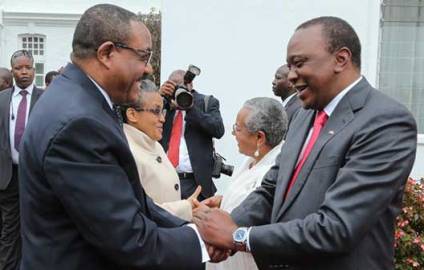Ethiopia, Kenya sign oil pipeline deal
By Tesfa-Alem Tekle
June 25, 2016 (ADDIS ABABA) – Ethiopia and Kenya this week signed a new deal on construction of a crude oil pipeline which would run from the Kenyan coastal town of Lamu to Ethiopian capital, Addis Ababa.

The new deal is a part of the joint infrastructure project to integrate the region under the Lamu Port- South Sudan-Ethiopia Transport (Lapsset) economic corridor.
The two leaders vowed to complete the construction of a refined oil products pipeline by the end of 2016 and pledged to speed up the construction of the Lapsset.
Per the agreement, the new pipeline, which is due to be launched in December, will run through two routes: from Nakuru-Isiolo-Moyale-Awasa to Addis Ababa and the second route will be from Lamu-Isiolo-Moyale-Awasa.
The latest agreement between the two neighbours came a month after Uganda abandoned a similar deal with Kenya and instead preferred to use Tanzania’s port for oil export.
The two countries have also signed a number of cooperation agreements on a range of other fields including the establishment of a Joint Railway Commission and Project Coordination Committee to help in the implementation of the bilateral agreement signed in March 2012 in Nairobi.
Also, the two leaders have witnessed the signing of five memorandums of understandings on energy, education, livestock, health, cross-border trade and sports.
Both Uhuru and Desalegn reiterated the importance of implementing the signed agreements and agreed to meet twice a year to review implementation of the reached agreements.
“Ministers will be meeting quarterly while the technical team will meet every month to ensure progress,” Uhuru said.
The Ethiopian premier to his part said “From here, implementation, implementation and implementation are the top three things that we will focus on”.
The new deal is said to ease cross-border trade hurdles as the agreements will allow the countries to open up their borders and there by facilitate investment and trade.
Both leaders have expressed commitment to “elevate the economic relations between the two nations through signing the historic special Status Agreement”.
In November 2012, Ethiopian and Kenyan governments signed a Special Status Agreement aimed to facilitate and boost their trade exchange volume.
(ST)
